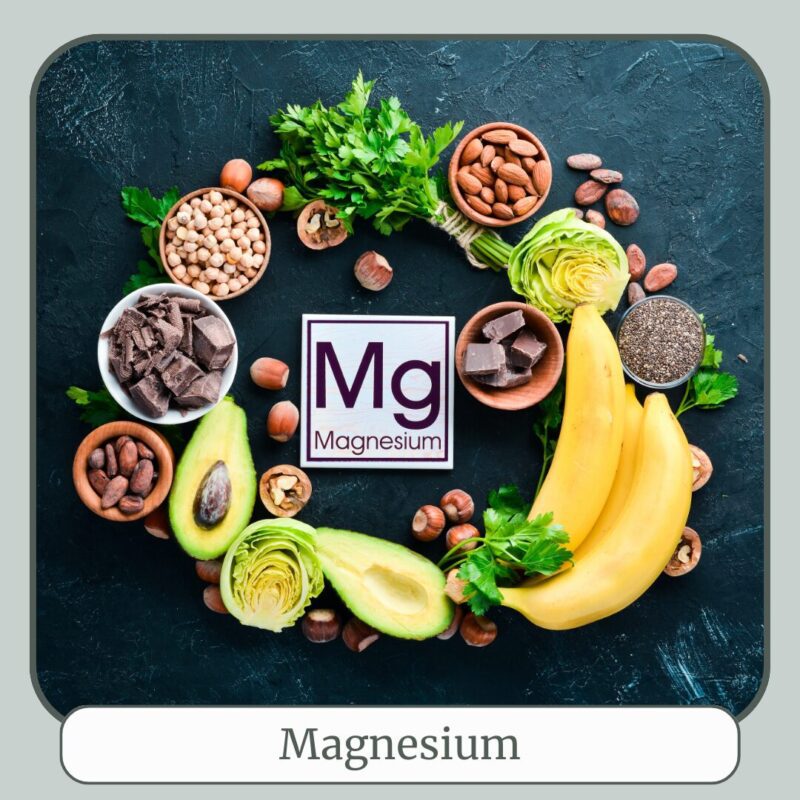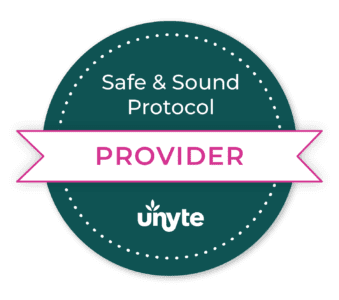Magnesium is often called the “miracle mineral” for its wide range of benefits, from reducing stress to improving sleep and supporting cognitive function. As one of the most abundant minerals in the body, magnesium plays a vital role in everything from energy production to muscle function, but its impact on mental health is especially notable. Unfortunately, many people don’t get enough magnesium through their diets, leading to common issues like stress, anxiety, and fatigue. This post explores how magnesium supports mental health, which forms are best for supplements, and how to boost your intake naturally.
Table of Contents
The Essentials: What You Need to Know About Magnesium
Magnesium is a crucial mineral involved in more than 300 biochemical reactions in the body, particularly in regulating neurotransmitters like serotonin, dopamine, and GABA, which influence mood, sleep, and cognitive performance. It also plays a key role in maintaining synaptic plasticity, the brain’s ability to form new connections, making it essential for learning and memory.
Magnesium helps manage the body’s stress response by controlling the release of cortisol, the stress hormone, and promoting relaxation through the parasympathetic nervous system. This makes it especially beneficial for individuals experiencing anxiety, sleep disturbances, or general stress.
While magnesium is found in many foods, including leafy greens, nuts, seeds, and whole grains, modern diets often fall short. Magnesium deficiency is linked to a range of mental health challenges, from anxiety and depression to cognitive decline, making adequate intake essential for emotional and cognitive well-being.
The Nutrient in Action: Magnesium and Mental Health
1. Stress and Anxiety Relief
Magnesium is a natural stress-reliever, helping to calm the nervous system and regulate the body’s response to stress. It does this by influencing the hypothalamic-pituitary-adrenal (HPA) axis, which is responsible for the release of cortisol, the primary stress hormone. When cortisol levels are too high, it can lead to chronic stress, anxiety, and other mental health issues. Magnesium helps lower cortisol and promotes the production of calming neurotransmitters like GABA, helping to keep anxiety in check.
2. Sleep and Relaxation
Magnesium is a key mineral in supporting restful sleep. It regulates the production of melatonin, the hormone that controls your sleep-wake cycle, and helps relax muscles and nerves, preparing your body for sleep. Deficiency in magnesium can lead to insomnia, restless sleep, and increased stress, which, in turn, negatively impacts mental health. By ensuring you have adequate magnesium levels, you support better sleep quality, which is vital for emotional and cognitive well-being.
3. Cognitive Function and Memory
Magnesium plays a crucial role in maintaining cognitive function, particularly through its influence on synaptic plasticity—the brain’s ability to adapt and form new connections. This makes magnesium essential for learning, memory, and overall mental agility. Research shows that low magnesium levels are associated with memory impairments and a decline in cognitive function, particularly in older adults. Maintaining adequate magnesium levels helps boost mental clarity and may even protect against age-related cognitive decline.
4. Mood Regulation and Depression
Magnesium has been linked to improved mood and the alleviation of depressive symptoms. This is because magnesium is essential for the synthesis and function of key neurotransmitters involved in mood regulation, such as serotonin and dopamine. Low levels of magnesium are often found in individuals suffering from depression, and supplementing with magnesium has been shown to improve mood and reduce the severity of depressive episodes, particularly in those with magnesium deficiencies.
How to Choose a Magnesium Supplement: A Guide
All forms of magnesium provide the body with the same essential mineral, so no matter which form you take, you’re still getting magnesium’s core benefits. However, different forms of magnesium have slightly different effects, making some better suited for specific needs. Here’s a breakdown of who might choose different forms and why:
- Magnesium Glycinate: This form is ideal for those dealing with anxiety, stress, or sleep issues. It’s easily absorbed and gentle on the stomach, making it a good option if you’re looking for something that promotes relaxation and calm.
- Magnesium Citrate: Best for those needing help with constipation or digestive health. While it’s well-absorbed, it has a natural laxative effect, so it’s also helpful if you’re looking to improve bowel regularity.
- Magnesium Threonate: If you’re looking for cognitive benefits like improved memory or focus, this form is particularly effective because it can cross the blood-brain barrier. It’s great for supporting brain function and may help with learning and memory retention.
- Magnesium Malate: Ideal for those dealing with muscle pain or chronic fatigue, magnesium malate is known for boosting energy levels and helping relieve muscle soreness.
- Magnesium Oxide: Commonly used for heartburn and indigestion, this form is less bioavailable than others but is widely available and affordable.
Who Should Choose Which Form?
- For stress relief and sleep: Magnesium glycinate is a top choice due to its calming properties and lack of digestive side effects.
- For digestive support: Magnesium citrate is your go-to if you’re looking for a mild laxative effect while still increasing magnesium intake.
- For brain health: Magnesium threonate is the best option if cognitive function and brain health are your focus, thanks to its ability to cross the blood-brain barrier.
- For muscle health and energy: Magnesium malate is particularly useful for athletes or those dealing with chronic pain and fatigue.
- For general use: If you’re just looking to increase magnesium levels with no specific focus, magnesium glycinate or citrate are versatile and widely recommended.
Blends of Magnesium
Many supplements on the market offer blends of different magnesium forms, providing a more comprehensive approach. These can be useful if you want to address multiple concerns at once—such as stress, digestive health, and energy—without needing multiple products. If you opt for a blend, ensure it includes forms with good bioavailability, like magnesium glycinate, citrate, or threonate.
Dosage and Concentration
The recommended daily intake of magnesium for adults is 300-420 mg, depending on age and gender. Most magnesium supplements will contain around 200-400 mg per dose. Be sure to follow dosage recommendations on the label and consult a healthcare provider if needed.
Bioavailability and Purity
Magnesium glycinate and threonate have some of the best bioavailability, meaning your body can absorb and use them more effectively. As with any supplement, make sure to choose high-quality products that are third-party tested to ensure they are free from contaminants and unnecessary fillers.
Top 10 Food Sources of Magnesium
- Leafy Greens (Spinach, Kale) – A rich source of magnesium and other essential nutrients
- Pumpkin Seeds – Packed with magnesium and perfect as a snack or salad topping
- Almonds – A nutrient-dense snack that provides both magnesium and healthy fats
- Avocados – Great for magnesium, potassium, and healthy fats
- Dark Chocolate – A treat that offers a surprising amount of magnesium (choose 70% or higher)
- Black Beans – An excellent plant-based source of magnesium and fiber
- Bananas – Not just for potassium; bananas are a good source of magnesium too
- Tofu – High in magnesium, making it a great option for vegetarians and vegans
- Salmon – Rich in magnesium, Omega-3s, and protein for overall brain health
- Cashews – A tasty way to increase your magnesium intake while boosting heart health
Get Your Fix: 3 Delicious Magnesium-Rich Recipes
1. Meat Recipe: Baked Salmon with Avocado Salsa
- Ingredients:
- 2 salmon fillets
- 1 avocado, diced
- 1/4 red onion, finely chopped
- 1 tablespoon olive oil
- Juice of 1 lime
- Salt and pepper to taste
- Directions:
- Preheat oven to 375°F (190°C). Season the salmon with salt and pepper.
- Bake the salmon for 12-15 minutes, or until cooked through.
- While the salmon bakes, mix the avocado, red onion, olive oil, lime juice, and seasonings in a bowl.
- Serve the baked salmon topped with the fresh avocado salsa.
2. Vegetarian Recipe: Spinach and Tofu Stir-Fry
- Ingredients:
- 1 block firm tofu, cubed
- 2 cups fresh spinach
- 1 tablespoon soy sauce
- 2 cloves garlic, minced
- 1 tablespoon olive oil
- Salt and pepper to taste
- Directions:
- Heat olive oil in a pan over medium heat. Add tofu and cook until golden.
- Add garlic and spinach, cooking until the spinach wilts.
- Stir in soy sauce, season with salt and pepper, and serve with rice or noodles.
3. Vegan Recipe: Quinoa and Black Bean Salad
Ingredients:
- 1 cup quinoa
- 1 can black beans, drained and rinsed
- 1 avocado, diced
- 1/4 cup pumpkin seeds (pepitas)
- 1/2 cup cherry tomatoes, halved
- 1/4 cup red onion, finely chopped
- 2 tablespoons olive oil
- Juice of 1 lime
- 1 tablespoon cilantro, chopped
- Salt and pepper to taste
Directions:
- Rinse the quinoa under cold water. Cook it according to package instructions (typically 1 cup quinoa to 2 cups water, simmering until the water is absorbed).
- Once cooked, fluff the quinoa with a fork and let it cool slightly.
- In a large bowl, combine the quinoa, black beans, avocado, pumpkin seeds, cherry tomatoes, and red onion.
- In a small bowl, whisk together the olive oil, lime juice, cilantro, salt, and pepper. Pour the dressing over the salad and toss gently to combine.
- Serve chilled or at room temperature.
-

Rachel Plympton, LCSW, brings 14+ years of expertise to her mission of creating lasting, whole-body wellness. Using a dynamic blend of Play Therapy, Cognitive Behavioral Therapy, Mindfulness, EMDR, and Safe and Sound Protocol™ (SSP), she helps clients break through barriers and achieve meaningful change. Rachel also offers Wellness Panels that reveal powerful insights into the link between mental and physical health. Whether working with children, teens, or adults, Rachel is dedicated to guiding her clients in transformation and resilience.
View all posts
 (281) 305-9387
(281) 305-9387










